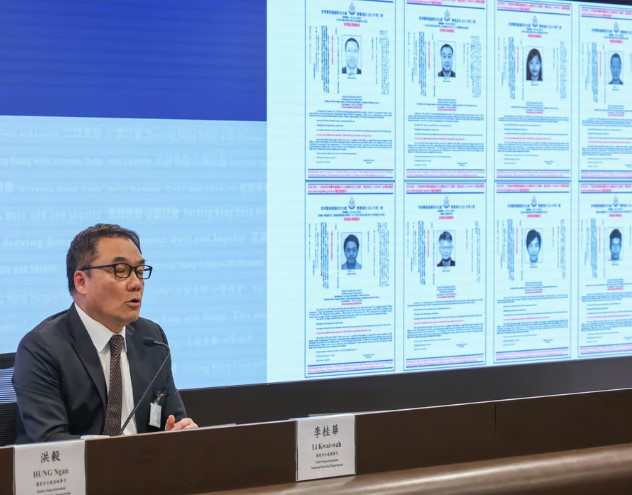Hong Kong authorities have intensified their efforts under the National Security Law by adding six more activists to their wanted list. Each of these individuals now has a bounty of HK$1 million (US$128,691) on their heads, making them targets for alleged violations of national security. This brings the total number of wanted individuals under the law to 19, with bounties placed on each of them.
National Security Crackdown Intensifies with Bounties on Activists
The six new additions to the list include people associated with advocacy, commentary, and activism. These individuals are accused of using various means to endanger national security, including advocating for Hong Kong’s independence, encouraging international sanctions, and disseminating uncensored information through media channels. The authorities have set bounties on these individuals, hoping to track them down and hold them accountable for their actions.
Among those targeted are a former leader of a student group advocating Hong Kong’s independence, a political commentator, and a founder of an overseas non-governmental organization. Other figures include a former district councilor now involved in advocacy work, a YouTuber accused of spreading anti-government messages, and a young advocate linked to a foundation focused on Hong Kong’s freedom. The government has stated that these individuals continue their activities from overseas, making them subjects of ongoing investigations with bounties placed on them for capture.
Passport Revocations and Financial Restrictions
In addition to the bounties, Hong Kong authorities have implemented strict measures aimed at curtailing the activities of individuals who have fled the city. Seven activists who had previously escaped have had their Hong Kong passports revoked. This step prevents them from traveling freely under Hong Kong’s identity and restricts their international mobility.
Furthermore, these individuals have been barred from receiving any form of financial support. The authorities have also prohibited transactions linked to property ownership, joint ventures, and partnerships involving these individuals. This comprehensive approach is intended to isolate the fugitives, with bounties placed on their heads to prevent them from accessing resources to continue their activities abroad.
The move is part of a broader pattern of enforcement. In June, similar restrictions were imposed on six other individuals accused of similar crimes. These restrictions included asset freezes, professional disqualifications, and removal from business leadership roles. Bounties were also issued for these individuals, demonstrating the government’s resolve to hold them accountable.
The six newly targeted activists face allegations of serious crimes under the National Security Law, including inciting secession and collusion with foreign forces. Authorities claim that these individuals have repeatedly called for international sanctions and independence for Hong Kong through social media and other platforms. Some of them are accused of engaging in these activities over several years, even before the National Security Law was enacted in 2020. Bounties on their heads are intended to help track them down and prevent further actions against Hong Kong’s security.
Legal Measures and Ongoing Enforcement
The actions taken by the Hong Kong government are part of a larger framework under the Safeguarding National Security Ordinance. This law, enacted under Article 23 of the Basic Law, serves as a domestic counterpart to the National Security Law imposed by Beijing in 2020. Together, these laws provide the legal basis for the ongoing crackdown on activities considered a threat to national security.
The ordinance grants authorities extensive powers, including the ability to revoke passports, freeze assets, and disqualify professionals. Police have expanded authority to investigate and charge individuals accused of breaching national security laws. Officials defend these measures as essential for maintaining stability and safeguarding Hong Kong’s interests, arguing that targeted individuals are deliberately undermining the city’s security and reputation through overseas platforms.
Organizations linked to the wanted individuals, often based abroad, are accused of spreading uncensored information and lobbying foreign governments for sanctions against Hong Kong and China. Authorities claim these actions are part of an organized effort to destabilize the city, posing significant threats to governance. Charges against the fugitives include inciting secession, promoting anti-government messages, and colluding with foreign forces, with officials vowing to pursue them indefinitely.
This ongoing campaign highlights the government’s determination to address challenges to its authority and enforce strict compliance with national security laws. The penalties imposed on the wanted individuals—ranging from financial restrictions to criminal charges—serve as a warning to others who might engage in similar activities. Hong Kong authorities remain firm in their position, using every available legal and administrative tool to curb dissent and protect what they define as national security.


